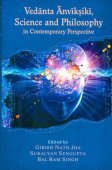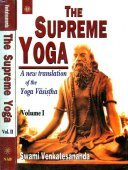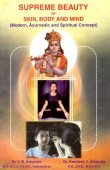Vedanta, Vedānta, Veda-anta, Vedamta: 18 definitions
Introduction:
Vedanta means something in Hinduism, Sanskrit, Jainism, Prakrit, Marathi. If you want to know the exact meaning, history, etymology or English translation of this term then check out the descriptions on this page. Add your comment or reference to a book if you want to contribute to this summary article.
In Hinduism
Purana and Itihasa (epic history)
Source: archive.org: Puranic EncyclopediaVedānta (वेदान्त).—See under Veda.

The Purana (पुराण, purāṇas) refers to Sanskrit literature preserving ancient India’s vast cultural history, including historical legends, religious ceremonies, various arts and sciences. The eighteen mahapuranas total over 400,000 shlokas (metrical couplets) and date to at least several centuries BCE.
Vaishnavism (Vaishava dharma)
Source: Pure Bhakti: Bhagavad-gita (4th edition)Vedānta (वेदान्त) refers to “literally, veda–‘Vedic knowledge’, anta–‘conclusion’. The Upaniṣads are the latter portion of the Vedas, and the Vedānta-sūtra summarizes the philosophy of the Upaniṣads in concise statements. Therefore the word ‘Vedānta’ especially refers to the Vedānta-sūtra”. (cf. Glossary page from Śrīmad-Bhagavad-Gītā).
Source: Pure Bhakti: Bhajana-rahasya - 2nd EditionVedānta (वेदान्त) refers to:—‘the conclusion of Vedic knowledge’. The Upaniṣads are the latter portion of the Vedas and the Vedānta-sūtra summarises the philosophy of the Upaniṣads in concise statements. Therefore, the word ‘Vedānta’ especially refers to the Vedānta-sūtra. (cf. Glossary page from Bhajana-Rahasya).

Vaishnava (वैष्णव, vaiṣṇava) or vaishnavism (vaiṣṇavism) represents a tradition of Hinduism worshipping Vishnu as the supreme Lord. Similar to the Shaktism and Shaivism traditions, Vaishnavism also developed as an individual movement, famous for its exposition of the dashavatara (‘ten avatars of Vishnu’).
Yoga (school of philosophy)
Source: ORA: Amanaska (king of all yogas): A Critical Edition and Annotated Translation by Jason BirchVedānta (वेदान्त) refers to the “Upaniṣads”, according to the Yogayājñavalkya 2.8-10ab.—Accordingly, while discussing the study of the Upaniṣads and the Purāṇas: “[In the case of Brahmins,] the wise say that the study of philosophy, [which is the sixth Niyama in this yoga system,] is the study of the Upaniṣads (vedānta). Like Brahmins, they prescribe the study of [the same] philosophy for Kṣatriyas. And †...† for good Vaiśyas, possessed of virtuous conduct, as well as [those] Śūdras, women and ascetics who maintain their religious duties, the wise say that the study of philosophy is the study of the Purāṇas”.

Yoga is originally considered a branch of Hindu philosophy (astika), but both ancient and modern Yoga combine the physical, mental and spiritual. Yoga teaches various physical techniques also known as āsanas (postures), used for various purposes (eg., meditation, contemplation, relaxation).
General definition (in Hinduism)
Source: WikiPedia: HinduismThe mystic teachings in Vedanta are centered on a fundamental truth of the universe that cannot be reduced to a concept or word for the ordinary mind to manipulate. Rather, the human experience and mind are themselves a tiny fragment of this truth. In this tradition, no mind-object can be identified as absolute truth, such that one may say, "That's it." So, to keep the mind from attaching to incomplete fragments of reality, a speaker could use this term to indicate that truth is "Not that."
In Jainism
General definition (in Jainism)
Source: archive.org: TrisastisalakapurusacaritraVedanta (वेदन्त) refers to the “doctrine of Māyā (illusion)”, as mentioned in chapter 1.1 [ādīśvara-caritra] of Hemacandra’s 11th century Triṣaṣṭiśalākāpuruṣacaritra: an ancient Sanskrit epic poem narrating the history and legends of sixty-three illustrious persons in Jainism.
Accordingly, as Mahāmati exposed the Vedanta doctrine to king Mahābala (i.e., previous incarnation of Ṛṣabha):—
“It is illusion (māyā); nothing is real. The visible world is like a dream or a mirage. A teacher and a disciple; a father and a son; virtue and vice; one’s own and another’s; such things as appear, that is only a form of expression, not reality. Just as the jackal left meat, and ran after a fish on the bank, and the fish got in the water and a vulture got the meat, exactly so those men are deceived and deprive themselves of both, who abandon pleasures of this world and run after those of the next world. After they have heard the false teaching of heretics, fearing hell, they foolishly torment their own bodies, alas! by vows, etc. Just as a partridge dances on one foot, afraid that it will fall on the ground, so a man practices penance fearing a fall into hell”.

Jainism is an Indian religion of Dharma whose doctrine revolves around harmlessness (ahimsa) towards every living being. The two major branches (Digambara and Svetambara) of Jainism stimulate self-control (or, shramana, ‘self-reliance’) and spiritual development through a path of peace for the soul to progess to the ultimate goal.
Languages of India and abroad
Marathi-English dictionary
Source: DDSA: The Molesworth Marathi and English Dictionaryvēdānta (वेदांत).—m (S) The theological part of the Vedas. Considered collectively, it is contained in the passages or chapters of the Vedas termed upa- niṣad. They inculcate an abstract and speculative monotheistical worship, and deny the actual existence of the material universe. 2 A theological system founded upon the Vedas, teaching that Matter is an illusion and that the sole existence is One all-pervading spirit. 3 The term is applied to any sage discourse upon the illusoriness and unreality of the objects of sense, or upon the emptiness of earthly pleasures, pains, or troubles.
Source: DDSA: The Aryabhusan school dictionary, Marathi-Englishvēdānta (वेदांत).—m The theological part of the Vedas.
Marathi is an Indo-European language having over 70 million native speakers people in (predominantly) Maharashtra India. Marathi, like many other Indo-Aryan languages, evolved from early forms of Prakrit, which itself is a subset of Sanskrit, one of the most ancient languages of the world.
Sanskrit dictionary
Source: DDSA: The practical Sanskrit-English dictionaryVedānta (वेदान्त).—
1) 'the end of the Veda', an Upaniṣad (which comes at the end of the Veda). Also
Derivable forms: vedāntaḥ (वेदान्तः).
Vedānta is a Sanskrit compound consisting of the terms veda and anta (अन्त).
--- OR ---
Vedānta (वेदान्त).—(See quotation from bṛhadyogiyājña- valkyasmṛti under -aṅga above).
Derivable forms: vedāntam (वेदान्तम्).
Vedānta is a Sanskrit compound consisting of the terms veda and anta (अन्त).
Source: Cologne Digital Sanskrit Dictionaries: Shabda-Sagara Sanskrit-English DictionaryVedānta (वेदान्त).—m.
(-ntaḥ) The theological part of the Vedas; considered collectively it is contained in the many numerous passages or chapters of the Vedas termed Upanishads, which inculcate an abstract and speculative monotheistical worship, and these have been further explained and illustrated by later writers: the founder of the school is Vyasa, and subsequently Sankaracharya is its most eminent teacher. E. veda the Vedas, and anta end, sum, scope or substance.
Source: Cologne Digital Sanskrit Dictionaries: Benfey Sanskrit-English DictionaryVedānta (वेदान्त).—i. e. veda-anta, m. 1. The complete Veda, [Mānavadharmaśāstra] 2, 160. 2. A philosophical system based particularly on the Upaniṣads, [Vedāntasāra, (in my Chrestomathy.)] in
Vedānta (वेदान्त).—[masculine] the end of the Veda or of the Veda-study; [Name] of a philos. system.
Source: Cologne Digital Sanskrit Dictionaries: Aufrecht Catalogus CatalogorumVedānta (वेदान्त) as mentioned in Aufrecht’s Catalogus Catalogorum:—by Svātmānandopadeśa. B. 4, 94. The latter is likely to be the true title.
Source: Cologne Digital Sanskrit Dictionaries: Monier-Williams Sanskrit-English Dictionary1) Vedānta (वेदान्त):—[from veda] a etc. See p.1017.
2) [from veda] b m. end of the Veda (= ‘complete knowledge of the Veda’ cf. vedānta-ga), [Taittirīya-āraṇyaka; Mahābhārata]
3) [v.s. ...] Name of the second and most important part of the Mīmāṃsā or third of the three great divisions of Hindū philosophy (called Vedānta either as teaching the ultimate scope of the Veda or simply as explained in the Upaniṣads which come at the end of the Veda; this system, although belonging to the Mīmāṃsā [q.v.] and sometimes called Uttara-mīmāṃsā, ‘examination of the later portion or jñāna-kāṇḍa [q.v.] of the Veda’, is really the one sole orthodox exponent of the pantheistic creed of the Hindūs of the present day a creed which underlies all the polytheism and multiform mythology of the people; its chief doctrine [as expounded by Śaṃkara] is that of Advaita id est. that nothing really exists but the One Self or Soul of the Universe called Brahman [neut.] or Paramātman, and that the Jīvātman or individual human soul and indeed all the phenomena of nature are really identical with the Paramātman, and that their existence is only the result of Ajñāna [otherwise called Avidyā] or an assumed ignorance on the part of that one universal Soul which is described as both Creator and Creation; Actor and Act; Existence, Knowledge and Joy, and as devoid of the three qualities [see guṇa]; the liberation of the human soul, its deliverance from transmigrations, and re-union with the Paramātman, with which it is really identified, is only to be effected by a removal of that ignorance through a proper understanding of the Vedānta; this system is also called Brahma-mīmāṃsā and Śārīrakamīmāṃsā, ‘inquiring into Spirit or embodied Spirit’; the founder of the school is said to have been Vyāsa, also called Bādarāyaṇa, and its most eminent teacher was Śaṃkarācārya), [Upaniṣad; Mahābhārata] etc.
4) [v.s. ...] m. [plural] the Upaniṣads or works on the Vedānta philosophy, [Manvarthamuktāvalī, kullūka bhaṭṭa’s Commentary on manu-smṛti on Manu-smṛti vi, 83.]
Source: Cologne Digital Sanskrit Dictionaries: Yates Sanskrit-English DictionaryVedānta (वेदान्त):—[vedā+nta] (ntaḥ) 1. m. The metaphysicotheological doctrines of the Vedas, teaching the abstract worship of God; name of a school of divinity or philosophy professing them.
Source: DDSA: Paia-sadda-mahannavo; a comprehensive Prakrit Hindi dictionary (S)Vedānta (वेदान्त) in the Sanskrit language is related to the Prakrit word: Veaṃta.
[Sanskrit to German]
Sanskrit, also spelled संस्कृतम् (saṃskṛtam), is an ancient language of India commonly seen as the grandmother of the Indo-European language family (even English!). Closely allied with Prakrit and Pali, Sanskrit is more exhaustive in both grammar and terms and has the most extensive collection of literature in the world, greatly surpassing its sister-languages Greek and Latin.
Kannada-English dictionary
Source: Alar: Kannada-English corpusVēdāṃta (ವೇದಾಂತ):—
1) [noun] one of the six main schools of ancient Indian philosophy.
2) [noun] Indian philosophy in gen.
3) [noun] a fundamental truth, law, doctrine or motivating force, upon which others are based; a principle.
4) [noun] the Upaniṣads, which form the concluding part of the vedas.
Kannada is a Dravidian language (as opposed to the Indo-European language family) mainly spoken in the southwestern region of India.
See also (Relevant definitions)
Partial matches: Veda, Veta, Anta.
Starts with (+156): Vedamtavedya, Vedanta Paribhasha, Vedantabhashya, Vedantabhihita, Vedantabhushana, Vedantacandra, Vedantacandrika, Vedantacarya, Vedantacaryacaritra, Vedantacaryacaritra vaibhavaprakashika, Vedantacaryadinacarya, Vedantacaryamangaladvadashaka, Vedantacaryamangaladvadashi, Vedantacaryaprapadana, Vedantacaryasaptati, Vedantacaryataraharavali, Vedantacaryavigrahadhyanapaddhati, Vedantacaryavijaya, Vedantacharyavijaya, Vedantacintamani.
Ends with: Advaita-vedanta, Anuvedanta, Bakavedanta, Dvaitavedamta, Madhvavedanta, Onavedamta, Samkhyavedanta, Samkshiptavedanta, Sanatsujatavedanta, Ubhayavedamta, Upayavedamta.
Full-text (+2267): Vedantin, Brahmasutra, Brahmamimamsa, Lingasharira, Vetavetantan, Vedantasara, Nigamanta, Vedantopagata, Vyashti, Shivotkarsha, Vedant, Svayambodha, Sharirakanyaya, Ishtasiddhi, Brahmamrita, Vedantashastra, Advaita-vedanta, Shrutaprakashikasamgraha, Sagunanirgunavada, Dashashloki.
Relevant text
Search found 188 books and stories containing Vedanta, Veda-anta, Vedamta, Vēdāṃta, Vedānta, Vēdānta; (plurals include: Vedantas, antas, Vedamtas, Vēdāṃtas, Vedāntas, Vēdāntas). You can also click to the full overview containing English textual excerpts. Below are direct links for the most relevant articles:
Brahma Sutras (Nimbarka commentary) (by Roma Bose)
Brahma-Sūtra 1.4.28 < [Adhikaraṇa 8 - Sūtra 28]
Brahma-Sūtra 3.4.23 < [Adhikaraṇa 3 - Sūtras 23-24]
Brahma-Sūtra 3.3.1 < [Adhikaraṇa 1 - Sūtras 1-5]
Samkhya thoughts in the Mahabharata (by Shini M.V.)
Vedānta Philosophy < [Chapter 3 - The Philosophical Tenets in the Śānti-parva]
The Concept of Liberation < [Chapter 3 - The Philosophical Tenets in the Śānti-parva]
Preceptors of Advaita (by T. M. P. Mahadevan)
Manusmriti with the Commentary of Medhatithi (by Ganganatha Jha)
Verse 6.94 < [Section VIII - The Renouncer of the Veda (vedasaṃnyāsika)]
Verse 2.160 < [Section XXVI - Chastisement of Pupils]
Verse 6.83 < [Section VII - Means of Removing Sin (kilbiṣa)]
Mandukya Upanishad (Gaudapa Karika and Shankara Bhashya) (by Swami Nikhilananda)
Mandukya Karika, verse 4.87 < [Chapter IV - Alatashanti Prakarana (Quenching the firebrand)]
Mandukya Karika, verse 2.12 < [Chapter II - Vaitathya Prakarana (Illusion)]
Mandukya Karika, verse 2.31 < [Chapter II - Vaitathya Prakarana (Illusion)]
Prasthanatrayi Swaminarayan Bhashyam (Study) (by Sadhu Gyanananddas)
2.6. Vedanta Darśana < [Chapter 1 - Introduction]
4.4i. A Tribute to Veda Vyāsa < [Chapter 2 - Analysis on the Basis Of Epistemology]
Related products
(+3 more products available)





